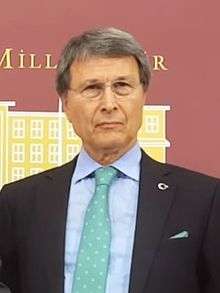Yusuf Halaçoğlu
Yusuf Halaçoğlu (born 10 May 1949, in Kozan, Adana) is a Turkish historian and politician. He is a former president of the Turkish Historical Society[1] and was a member of the Turkish Parliament from 2011-2017 representing the electoral district of Kayseri for the Nationalist Movement Party (MHP) and from 2017 for the Good Party.
Yusuf Halaçoğlu MP | |
|---|---|
 | |
| Member of the Grand National Assembly | |
| In office 12 June 2011 – 7 July 2018 | |
| Constituency | Kayseri (2011, June 2015, Nov 2015) |
| Chairman of the Turkish Historical Society | |
| In office 27 September 1993 – 23 July 2008 | |
| Prime Minister | Tansu Çiller Mesut Yılmaz Necmettin Erbakan Bülent Ecevit Abdullah Gül Recep Tayyip Erdoğan |
| Preceded by | İbrahim Agâh Çubukçu |
| Succeeded by | Ali Birinci |
| Personal details | |
| Born | 10 May 1949 Kozan, Adana Province, Turkey |
| Political party | Nationalist Movement Party (2011-2017) Good Party (2017-2018) |
| Alma mater | Istanbul University |
| Occupation | Academic, politician and author |
| Profession | Historian |
He studied history at Istanbul University and pursued an academic career at the same university after graduating in 1974. In 1983, he became an assistant professor. Halaçoğlu entered Marmara University in 1986, and in 1989 he was appointed a professor. After serving in leading positions at the Turkish State Archives, he returned to the university in 1992. From 1993 on, he served as the chairman of the Turkish Historical Society until his dismissal in 2008. He then returned to his chair at Gazi University.
In the 2011 general election, Halaçoğlu was elected into parliament, and was reelected in June[2] and November 2015.[3] In November 2015, the MHP nominated him for Parliamentary Speaker, where he finished on fourth place. In 2017 he left the MHP to be a founding member of a new party, the Good Party.[4] He was deselected as a candidate for the 2018 Election[5]After the 2018 elections, he resigned from the Good Party.[4]
Views
Halaçoğlu is a well-known denier of the Armenian Genocide and has authored several works that mitigate the suffering the Armenians underwent during World War I. He places the number of deaths during the deportations, which he calls "forced relocations", at no higher than 9,000-10,000 (as opposed to the 1,000,000 to 1,500,000 that is widely stated by those who acknowledge the genocide).[6] His views closely parallel the official Turkish state thesis that the massacres and death marches did not constitute genocide. His research has been criticized by such scholars as Taner Akçam.[7] In 2008 Halaçoğlu was dismissed from his post as the head of the Turkish Historical Society for his controversial claims about Armenians and Kurds.[8]
In the year 2004 he was prosecuted in Winterthur, Switzerland after he denied the Armenian genocide in a speech he held at the Turkish Association in Winterthur.[9][1]
References
- "Augenzeuge aus dem Appenzell | NZZ". Neue Zürcher Zeitung. 2006-12-23.
- "MHP Kayseri Seçim Sonuçları - 7 Haziran 2015 Genel Seçimleri | SABAH". www.sabah.com.tr. Retrieved 2019-09-30.
- "KAYSERİ SEÇİM SONUÇLARI - 1 KASIM 2015 GENEL SEÇİM SONUÇLARI". secim.haberler.com. Retrieved 2019-09-30.
- "Good Party in distress as founding members quit citing Akşener's policies, election defeat". DailySabah. Retrieved 2019-09-30.
- "Yusuf Halaçoğlu, Mansur Yavaş'la birlikte sahaya indi".
- See, for example, Yusuf Halaçoğlu, "Realities Behind Relocation," in Armenians in the Late Ottoman Period, ed. Türkkaya Ataöv. Ankara: Turkish Historical Society, 2001, pp. 109-42, figure on p. 140.
- Akçam, Taner, The Young Turks' Crime Against Humanity: The Armenian Genocide and Ethnic Cleansing in the Ottoman Empire. Princeton: Princeton University Press, 2012, pp. 354-56.
- "Controversial historian dismissed from office". Hurriyet. 24 July 2008.
- Behrens, Paul (2016-03-16). The Criminal Law of Genocide: International, Comparative and Contextual Aspects. ISBN 9781317036968.